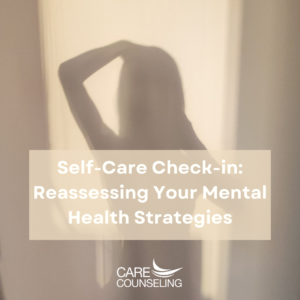Self-Care Check-in
 In the hustle and bustle of daily life, it’s all too easy to neglect our mental health needs. Just like any other aspect of our lives, our mental well-being requires consistent attention and care. As the seasons change and we approach the end of the year, now is an ideal time to pause, reflect, and conduct a thorough self-care check-in. By reassessing our mental health strategies and making any necessary adjustments, we can ensure that we’re prioritizing our emotional well-being and setting ourselves up for a more fulfilling journey ahead.
In the hustle and bustle of daily life, it’s all too easy to neglect our mental health needs. Just like any other aspect of our lives, our mental well-being requires consistent attention and care. As the seasons change and we approach the end of the year, now is an ideal time to pause, reflect, and conduct a thorough self-care check-in. By reassessing our mental health strategies and making any necessary adjustments, we can ensure that we’re prioritizing our emotional well-being and setting ourselves up for a more fulfilling journey ahead.
The Importance of Regular Self-Care Assessment
Self-care is more than just a buzzword—it’s a fundamental practice that empowers us to live our lives with intention, balance, and resilience. Just as our physical health requires regular check-ups, our mental health deserves the same level of attention. A self-care check-in allows us to evaluate whether our current strategies are serving us well, identify areas for improvement, and make conscious choices that enhance our overall well-being.
Conducting a Meaningful Self-Care Check-in
A self-care check-in involves more than a casual glance at your routine. It requires deep introspection and a willingness to explore the nuances of your emotions, behaviors, and habits. Here’s a step-by-step guide to conducting a meaningful self-care assessment:
- Create a Quiet Space
Find a quiet and comfortable space where you can reflect without distractions. Whether it’s a cozy corner of your home or a peaceful outdoor spot, make sure you have the privacy and tranquility you need to delve into your thoughts.
- Reflect on Recent Experiences
Begin by reflecting on your recent experiences and emotions. Have you been feeling stressed, anxious, or overwhelmed? Conversely, have there been moments of joy, contentment, or accomplishment? Take note of the emotional patterns that have emerged.
- Evaluate Your Self-Care Practices
Review your current self-care practices. Are they aligned with your needs and priorities? Are they effective in promoting your mental and emotional well-being? Consider activities such as meditation, journaling, exercise, social connections, hobbies, and time spent in nature.
- Identify Gaps and Challenges
Identify any gaps or challenges in your self-care routine. Are there areas where you feel you could improve? Are there activities you’ve been neglecting or avoiding? Be honest with yourself about what’s working and what’s not.
- Assess Your Stress Levels
Assess your stress levels and how you’ve been managing stress. Are there specific triggers that consistently lead to stress? How have your coping mechanisms been working for you? Consider implementing stress reduction techniques such as deep breathing, mindfulness, or progressive muscle relaxation.
- Prioritize Sleep and Rest
Sleep is a cornerstone of mental well-being. Evaluate your sleep patterns and the quality of your rest. Are you getting enough sleep? Are you practicing good sleep hygiene? Adjusting your sleep habits can have a profound impact on your overall mental health.
- Engage in Emotional Inventory
Engage in an emotional inventory by acknowledging your feelings without judgment. Are there emotions you’ve been suppressing or avoiding? By allowing yourself to experience and express your emotions, you promote emotional authenticity and self-compassion.
- Set Realistic Boundaries
Assess your boundaries—both with others and yourself. Are you overextending yourself? Are you saying “yes” when you really mean “no”? Setting realistic boundaries is essential for maintaining your mental and emotional energy.
- Consider Professional Support
If you’ve been struggling with persistent emotional challenges or mental health concerns, consider seeking support from a mental health professional. Therapy or counseling can provide valuable insights and tools to navigate your emotions and challenges.
- Craft a Revised Self-Care Plan
Based on your reflections and assessments, craft a revised self-care plan. Be intentional about incorporating activities and strategies that align with your needs and values. Your plan should be dynamic and adaptable, evolving as your circumstances change.
Nurturing Your Wellbeing
In a world that often prioritizes productivity and external achievements, it’s essential to carve out dedicated time for self-care and reflection. A self-care check-in is not just an exercise—it’s a commitment to your mental, emotional, and spiritual well-being. By regularly reassessing your mental health strategies, you’re taking proactive steps to nurture your inner world, build resilience, and cultivate a life that is truly aligned with your authentic self.
As you embark on your self-care check-in journey, remember that self-compassion is key. Treat yourself with the same kindness and understanding that you would extend to a dear friend. Through this practice of self-reflection and adjustment, you’re investing in your own growth, happiness, and ability to navigate life’s challenges with grace.



























